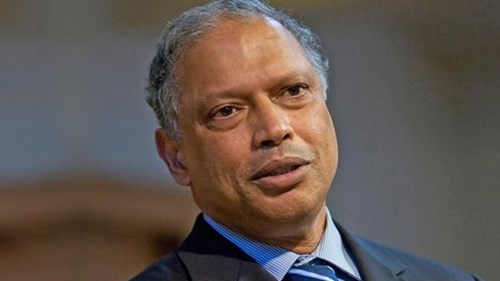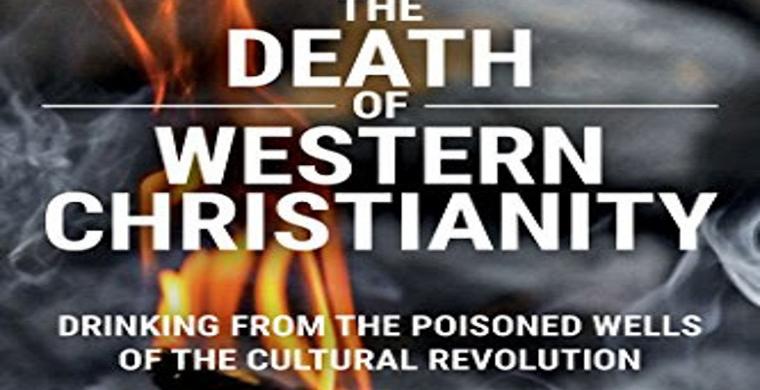The Death of Western Christianity. By Patrick Sookhdeo
Reviewed by Bill Muehlenberg
https://billmuehlenberg.com/
May 4, 2018
Isaac Publishing, 2017.
This new volume by Patrick Sookhdeo is well worth reading. And the author is well-placed to offer us a global perspective on such matters. As the director of Barnabas Fund for several decades, an English aid agency devoted to helping the persecuted church, he has the bigger picture in view here.
He knows how myopic Western Christians can be. His subtitle says it all: "Drinking from the Poisoned Wells of the Cultural Revolution." In this book he speaks of how the church in the West once blazed brightly, but now the flame is all but out.
He notes how the corruption is found everywhere, but especially in church leadership. All this is resulting in declining church numbers and the irrelevance of Christianity for so many people in the West. Writes Sookhdeo:
Today, the Church is scarcely distinguishable from society. . . . This has left the Church facing a fatal crisis of identity. Desperate to survive and remain relevant, it has struck a Faustian bargain with postmodern Western ideals, tolerating and taking on unorthodox beliefs and behaviours. This has, in fact, produced the opposite effect, alienating even more people and making the Church an object of ridicule.
 He notes that not only is the West promoting its decadent and debased values and beliefs around the world, but so too is the church. A Western church awash in materialism, self-centredness, bogus health and wealth gospels, and a fixation on self-esteem is promoting those bogus beliefs and values around the world.
He notes that not only is the West promoting its decadent and debased values and beliefs around the world, but so too is the church. A Western church awash in materialism, self-centredness, bogus health and wealth gospels, and a fixation on self-esteem is promoting those bogus beliefs and values around the world.
No wonder things are in such a mess. The rest of the world used to look to Western Christianity for hope, for answers, and for gospel truth. Now increasingly the rest of the world is just getting a watered down and worldly gospel which will do them no good.
Sookhdeo offers a number of chapters detailing with how the church has been compromised, weakened and sidelined by cosying up to materialism, immorality, relativism, secular humanism and various worldly agendas. Consider for example how our post-truth culture has had so much influence in our churches.
He offers various examples of this and mentions a 2016 article which speaks of the five big lies pastors tell. These include: how big their church is; how healthy it is; and how strong their marriage and family are. He then reminds us of Jeremiah's "four-point lie-detector to uncover false prophets":
-they are in ministry for the money
-they have low moral standards
-their theology is fanciful
-their prophecies prove false
Hmm, sounds like a lot of church leaders and pastors today. He also cites an oft-repeated piece of research on what American Christian teens believe. Researchers Smith and Duncan called it "moralistic therapeutic deism". He contains these elements:
-God made us and watches over us
-God wants us to be good people and nice to each other
-the main aim of life is to be happy and feel good about yourself
-God is only needed in your life when a special problem arises
-good people go to heaven when they die
Hmm, that is not exactly biblical Christianity there. But this is what passes for the faith amongst far too many people, especially young people, in Western churches today. And this is basically what is being taught in far too many churches, including some of the biggest and most popular megachurches around.
Related to this is the health and wealth gospel in which God's favour is largely determined by how rich and successful you are. But the "poor in the West or in developing countries are made to feel inadequate, inferior, abandoned and unloved by God because of their poverty. Shockingly, this amounts to a form of imperialism based on a consumerist culture."
He reminds us of the things Jesus said about the churches in the book of Revelation. Some of the churches were especially excoriated by him: "The Ephesians and the Laodiceans were teetering on the brink of apostasy, not because of persecution but because of self-love which led to indifference to Christ. The Thyatirans had gone a step further and had actually apostatised, learning 'Satan's so-called deep secrets,' yet they continued to consider themselves a church of Christ's disciples."
Is the church in the West in the same condition? Says Sookhdeo, "After the Church of England's General Synod passed its resolutions in favour of transgenderism and homosexuality in 2017, Biblical scholar and columnist Jules Gomes pointed out that, in the 500th years of the Reformation, the church had 'crossed the thin red line from apostolic to apostate.'
He does not just offer us a Jeremiad of everything that is wrong, but points us in a better direction. He says we need a number of things, including a return to orthodoxy and an embrace of core Christian beliefs. We need a return to close-knit community where we are responsible for, and accountable to, one another. We need to return to biblical holiness, and we need to give ourselves afresh to evangelism and missions.
All in all, things are looking very bleak for the Western church right now. He says that perhaps God in his mercy will send us more Wesleys and Whitefields. Only a mighty revival of God will impact first the Western church, and then the rest of the West.
He concludes his volume this way:
What if God does not bring the earthquake of reversal and the fire of revival? In that case, Christians in the West who are faithful in their love for the Lord must prepare for persecution. As anti-Christian pressures rise and lure Christians into apathy and apostasy, the faithful remnant will have to be ready to suffer or else to go into hiding as an underground church -- and from there to mount a guerrilla resistance against the world and Satan's throne.
Lest the reader finds all this too hard to grasp, let me remind you that the early Christians were in exactly the same place. And by the grace of God and a lot of hard work and fervent prayer, they eventually turned the world upside down. It has happened before, and if need be, it can happen again.
Do I share Sookhdeo's analysis and pessimism? Yes I do. No one carefully looking at the state of the church and the state of the world right now can be bubbly optimistic. Thus a realistic assessment of where the church in the West is at is vitally needed.
Just as God's people in times past needed God's prophets to wake them up and get them back on course, we need a strong and sustained wakeup call like this today. Thank you Patrick Sookhdeo for doing just that.
*****
Can authentic Christian faith survive in the West?
by Andrew Symes,
Anglican Mainstream
May 4, 2018
A new book from an experienced cultural commentator and campaigner for the persecuted church paints a bleak picture of how the Church in Europe and North America has been influenced by the "poisoned wells" of contemporary culture. 'The Death of Western Christianity' (Isaac Publishing), summarises some of the main challenges in the ideological landscape, and gives some pointers as to what faithful Christians must do to maintain a witness to Christ and biblical truth in an increasingly dark context.
Author Patrick Sookhdeo argues that "Western society has undergone a massive cultural transformation, disastrously affecting the...church". As anti-Christian worldviews have taken hold in society, large numbers of Christians have accommodated and compromised their faith to fit in with the new ideas, while others have abandoned the faith altogether. Sookhdeo concludes that a genuine revival and spiritual transformation in society is needed, and if this does not happen, faithful Christians should prepare for persecution, and operating in exile as an underground church.
In the first chapter, statistics, and snapshots from popular culture illustrate how mainline church attendance is rapidly declining despite attempts to be 'relevant'. Chapter two outlines some of the 'isms' of Western culture, for example individualism, existentialism and consumerism. The next two chapters explore how these ideologies have affected the church, for example in attitudes to sexual morality and marriage, worship, prayer and discipleship.
Postmodern concepts of 'truth' have led to a loss of confidence in Scripture. As Sookhdeo points out, churches with a more biblically orthodox theology are more likely to grow. But he issues a challenging critique of this form of Christianity in the West: gospel-oriented evangelicals often have a blind spot about materialism and are unwilling to pay a price in terms of suffering for their faith and sacrificially giving to help their needy neighbours.
In a major cultural shift, indifference to the things of God, and perhaps gentle mocking of committed Christians has given way to active hostility and intolerance. In many circles today, biblical Christian faith is not just seen as weird, but 'extremist' and even dangerous. A number of examples are given of marginalization of and legal sanctions against Christians from around the world. Sookhdeo does not believe, as some do today, that these cases derive from a failure of winsome communication; rather the type of Christianity which is not targeted by society's new rulers has "capitulated to the new Babylonian captivity of Western society" (p129).
Much of the church in the West is weak, even apostate, according to Sookhdeo. But it can be strengthened, by re-establishing its core identity, built on creeds (certainty about what it believes), community (God-connected fellowship which is pastoral and missional), and commandments (repentance from sin, commitment to holiness). Separation from 'pseudo-Christians', and financial sacrifice will be required.
'The Death of Western Christianity' is written in an easy to read, brisk style. It provides a wealth of well-organised information without getting bogged down in detail. Those who prefer their prophets to say "everything's fine" will ignore this book, but those wanting analysis of the real situation, and a call to urgent prayer and action, will find it very helpful.
See also: Christianity's death-bad lesson from Islam, by Jules Gomes here: http://www.virtueonline.org/christianitys-death-bed-lesson-islam














